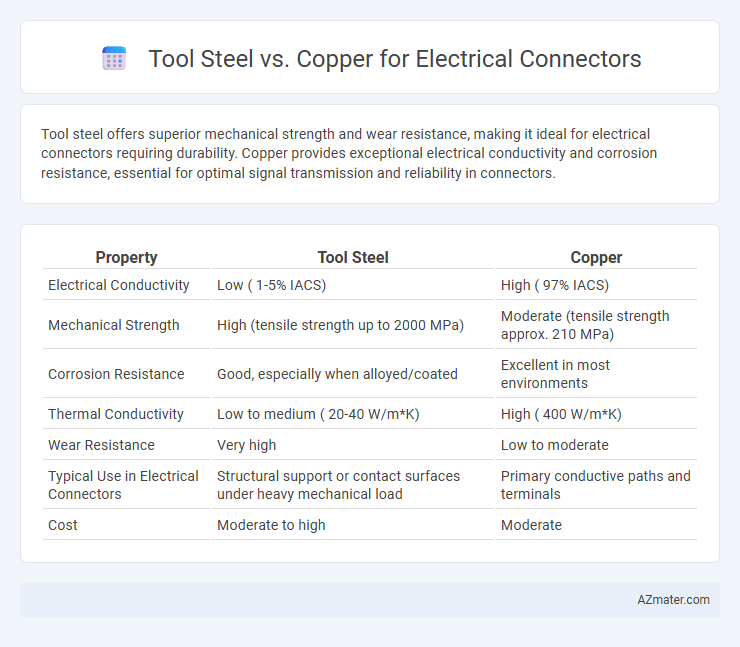Tool steel offers superior mechanical strength and wear resistance, making it ideal for electrical connectors requiring durability. Copper provides exceptional electrical conductivity and corrosion resistance, essential for optimal signal transmission and reliability in connectors.
Table of Comparison
| Property | Tool Steel | Copper |
|---|---|---|
| Electrical Conductivity | Low ( 1-5% IACS) | High ( 97% IACS) |
| Mechanical Strength | High (tensile strength up to 2000 MPa) | Moderate (tensile strength approx. 210 MPa) |
| Corrosion Resistance | Good, especially when alloyed/coated | Excellent in most environments |
| Thermal Conductivity | Low to medium ( 20-40 W/m*K) | High ( 400 W/m*K) |
| Wear Resistance | Very high | Low to moderate |
| Typical Use in Electrical Connectors | Structural support or contact surfaces under heavy mechanical load | Primary conductive paths and terminals |
| Cost | Moderate to high | Moderate |
Introduction: Tool Steel vs Copper in Electrical Connectors
Tool steel and copper differ significantly in electrical connector applications due to their distinct physical and electrical properties. Copper offers excellent electrical conductivity, making it the preferred material for efficient current flow in connectors. Tool steel, while mechanically robust and wear-resistant, exhibits lower conductivity but may be used in connectors requiring high strength and durability under mechanical stress.
Material Properties Overview
Tool steel offers superior hardness, wear resistance, and mechanical strength, making it ideal for connectors requiring durability under high mechanical stress. Copper provides excellent electrical conductivity, thermal conductivity, and corrosion resistance, ensuring efficient current flow and longevity in electrical connectors. The choice between tool steel and copper hinges on the balance between mechanical robustness and electrical performance for specific connector applications.
Conductivity Comparison
Copper exhibits significantly higher electrical conductivity, approximately 58 MS/m, compared to tool steel, which typically ranges below 10 MS/m. This superior conductivity makes copper the preferred choice for electrical connectors where efficient current flow and minimal energy loss are critical. Tool steel, while offering greater mechanical strength and wear resistance, results in higher electrical resistance, increasing heat generation in electrical connections.
Mechanical Strength Analysis
Tool steel demonstrates significantly higher mechanical strength compared to copper when used in electrical connectors, making it more resistant to deformation and wear under mechanical stress. Copper, while offering excellent electrical conductivity, has lower tensile strength and hardness, which can lead to faster degradation in connectors subjected to repeated mechanical loading. Mechanical strength analysis shows tool steel provides better durability and longevity in harsh environments where connectors face frequent mechanical impact or vibration.
Corrosion Resistance in Electrical Environments
Copper outperforms tool steel in corrosion resistance within electrical environments due to its excellent conductivity and natural oxide layer that prevents degradation. Tool steel, while mechanically robust, is prone to rust and oxidation when exposed to moisture and electrical currents, compromising connector performance. The superior corrosion resistance of copper ensures longer durability and consistent electrical contact in connectors used in harsh or humid conditions.
Thermal Performance and Heat Dissipation
Copper outperforms tool steel in thermal performance and heat dissipation due to its high thermal conductivity, approximately 400 W/m*K, compared to tool steel's significantly lower range of 20-50 W/m*K. This superior conductivity allows copper electrical connectors to efficiently transfer and dissipate heat generated during operation, reducing the risk of overheating and improving overall reliability. Tool steel connectors, while mechanically strong, often exhibit higher thermal resistance, making them less suitable for applications requiring rapid heat dissipation.
Durability and Lifespan
Tool steel offers superior mechanical strength and wear resistance compared to copper, making it highly durable in harsh environments and under mechanical stress. Copper excels in electrical conductivity but is softer and more prone to deformation, leading to shorter lifespan in connectors subjected to frequent mating cycles and mechanical strain. For electrical connectors requiring both durability and longevity, composite solutions or plating copper with harder materials can balance conductivity with enhanced wear resistance.
Cost Implications and Availability
Tool steel offers higher strength and wear resistance but comes at a greater cost and limited availability compared to copper, which is more affordable and widely available. Copper excels in electrical conductivity, making it the preferred choice for electrical connectors despite its softer mechanical properties. Balancing cost implications reveals copper as more economical and accessible, while tool steel may incur higher expenses due to material and manufacturing complexities.
Typical Use Cases in Electrical Connectors
Tool steel is commonly used in electrical connectors requiring high mechanical strength and wear resistance, such as contact pins and sockets subjected to frequent mating cycles. Copper, known for its excellent electrical conductivity and corrosion resistance, is preferred in connectors where minimizing electrical resistance and heat generation is critical, such as in power distribution and signal transmission connectors. Applications involving rapid signal transfer or high current load often combine copper with surface coatings like silver or gold to enhance performance and durability.
Conclusion: Choosing the Best Material
Tool steel offers superior mechanical strength and wear resistance, making it ideal for connectors requiring durability under high stress and repeated mating cycles. Copper excels in electrical conductivity and corrosion resistance, providing efficient current flow and long-term reliability in electrical connections. Selecting the best material depends on application priorities: copper is preferred for optimal electrical performance, while tool steel is chosen when mechanical robustness is critical.

Infographic: Tool steel vs Copper for Electrical connector
 azmater.com
azmater.com